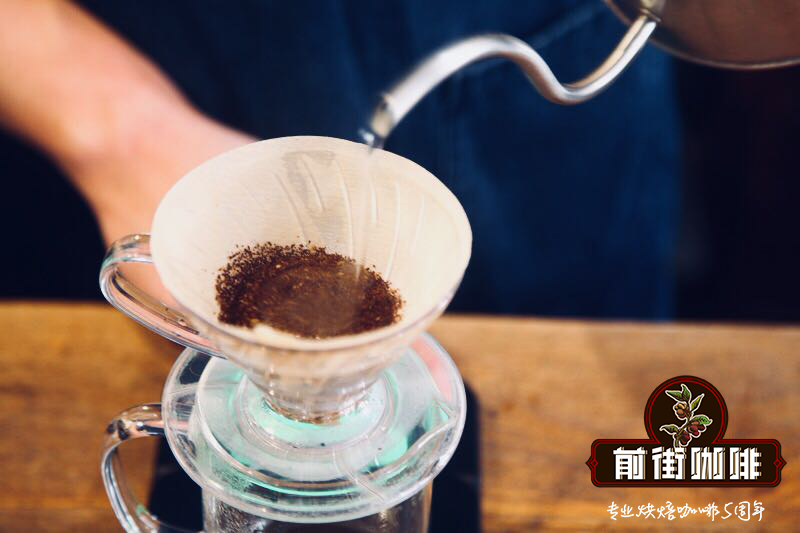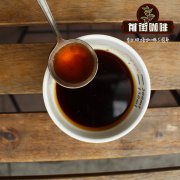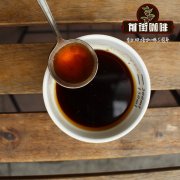Hand coffee brewing skills: how to make "expired" coffee by hand? How to make Jensen Rose Summer Coffee

Professional coffee knowledge exchange more coffee bean information please follow the coffee workshop (Wechat official account cafe_style)
Everyone must have had the experience: if the coffee has been kept for a long time, do you throw it away? Or do you continue to use it and reluctantly drink a cup of insipid coffee? Is the expired coffee irreparable? The following editor will share with you today's topic of how to make expired coffee by hand.
Coffee "shelf life"
First of all, we make it clear that the so-called shelf life refers to the best taste period of coffee, not the shelf life of food (usually the manufacturer will write a shelf life of one year), and coffee should be kept away from the light in the form of roasted coffee beans. Sealed under cool conditions, no matter how powerful the master is unable to recover.
So how long is the best taste period for coffee? We suggest that from the time the coffee is roasted, the coffee will be roasted for 30 days. Some coffee can be extended to about 45 days under proper preservation conditions. Therefore, the term "expiration" we mentioned is generally based on 30 days. At this time, the exhaust of coffee beans basically disappeared, medium-deep roasting-deep-roasted coffee beans will be slightly "out of oil". But if the coffee is badly oiled due to improper preservation, or if it smells only woody, it means that the coffee beans are no longer suitable for tasting, so throw them away for the sake of health.
So if it is preserved well, but how to cook the coffee that is no longer fresh?
First of all, we should understand that the flavor of coffee reaches its peak in the third to seventh day of baking, and then it will be lost over time, leaving only woody flavor. The first flavor substances lost are flowers and fruits, volatile acids, spices and herbs, while nuts, chocolate, caramel and other flavors are relatively difficult to volatilize, and ground coffee powder will lose flavor faster than in the form of coffee beans. This is also the fundamental reason why we want the coffee to be fresh, freshly ground and brewed.
So if you want the coffee after the best taste period to still have rich flower and fruit notes, bright and lively acidity, it's unlikely. However, at this time, the basic taste experience of some coffee, such as chocolate and nutty, will be more prominent, the taste will tend to be balanced, and the complex chemical changes in coffee beans may develop some unexpected flavors, or it may be less obvious. Now the flavor is highlighted-it's important that you know how to make it.
Here are some basic methods for editors:
1. Change the extraction time
two。 Change the water temperature
3. Change the degree of grinding.
This is a state of dynamic equilibrium, for example, if you choose to grind for a long time and rough, then the water temperature will be reduced; if you choose fine grinding, the extraction time will be relatively shortened and the water temperature will be lowered. No matter how you adjust it, all we want is a good cup of coffee. Try it a few more times and find the most appropriate way to save your coffee.
The method recommended by the editor is to use coarser grinding to reduce the water temperature and prolong the extraction time to extract coffee.
Here is an example of [Jensen] Rose Summer Coffee, which has been preserved in the shade for 50 days. Use a V60 filter cup with a water temperature of 88 degrees (91 degrees when fresh) and a ratio of water to powder at 1:15.
1. Rough grinding, as the volatile aromatic substances of coffee have been basically lost, fine grinding extraction will be more likely to bring out bitter taste, choose a thicker grinding degree can effectively avoid excessive extraction.
two。 The steaming time is shortened, the carbon dioxide in the coffee is also lost, and there will be no "hamburger". Water can easily permeate every coffee powder, so there is no need for long steaming and exhaust, otherwise it will cause excessive steaming and over-extraction.
3. The water flow should not be too high so as not to stir too much. Rinse carefully around the size of a small coin in the center and force out the flavor substances while stewing. You can see the foam being pressed out slowly.
When the water level rises to normal, you can stop injecting water, and then rinse again when the water level drops about 1x3. At this time, you can increase the range of coffee brewing, but not to filter paper. The height of the water flow is reduced, so you must treat it gently at this time. The whole extraction time is slightly longer, which can bring out more sweetness.
Jensen rose summer, although faded from the flowers and fruit, brings out the aroma of red wine, with a supple taste, round acidity, sweetness of caramel and walnut finish.
When it comes to "out-of-date" coffee, you don't have to worry about it anymore-but it's best to drink it fresh!
Important Notice :
前街咖啡 FrontStreet Coffee has moved to new addredd:
FrontStreet Coffee Address: 315,Donghua East Road,GuangZhou
Tel:020 38364473
- Prev

How to use the kettle how to clean the kettle? The principle of the pressure kettle
Professional coffee knowledge exchange more coffee bean information Please pay attention to the coffee workshop (Wechat official account cafe_style) French filter kettle (French press) is the easiest coffee utensil to operate, very popular in Europe and the United States, but most Taiwanese 'impression of him is used to make tea, in fact, its coffee flavor is not inferior to that of hand-brewed coffee, and it can be used at one time.
- Next

Is the coffee made from the mocha pot bitter and astringent? The correct use of the mocha pot.
Professional coffee knowledge exchange more coffee bean information Please follow the coffee workshop (Wechat official account cafe_style) it is not difficult to make good coffee in a mocha pot. Here are 6 ways to avoid bitterness: 1. The choice of coffee beans deep-baked coffee beans with a higher cooking water temperature of the mocha pot, it is more difficult to show its delicate sour and bitter flavor, boiled bitter taste will be
Related
- What is the meaning of lactic acid fermentation with coffee bean treatment?
- How to judge the state of foam by sound?
- How does the latte pull out the unicorn pattern? Come to get for a little trick to improve the flower pull!
- Will flower pulling affect the taste of the latte?
- Do you know the history of coffee?
- The difference between honey treatment and sun washing what is raisin honey treatment?
- What kind of milk can a novice use to make coffee foam to keep the foam longer? The correct method and skills of milking tutorial sharing
- Why do washed coffee beans taste sour? Flavor characteristics of washed Coffee
- Introduction to the skill of how to practice the size and height of water injection around the circle of hand-brewed coffee
- How do beginners practice coffee flower drawing from scratch?

